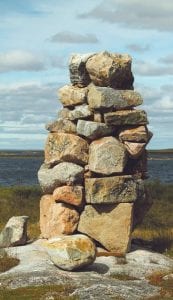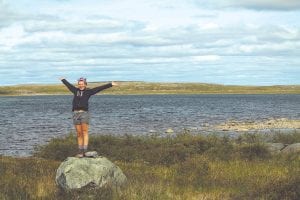Whitewater, wind, grizzly bears, wolverines, dive-bombing seagulls, ice, mosquitoes, black flies. Whitewater, midnight sun, northern lights, caribou, camaraderie, ancient Inuit artifacts, lakes as smooth as glass. The challenges were large, but the rewards were greater for Cook County High School senior Mara MacDonell, who spent 41 days last summer paddling in the Arctic with four other teenagers and a 24-year-old guide.
The canoe expedition, 50 days total, was the pinnacle of “The Menogyn Progression,” a series of five progressively longer trips that take Camp Menogyn campers on backpacking, climbing, or canoe trips ranging from eight to 50 days. Mara had been on previous trips with the other girls in her group, who were all from the Twin Cities. They had to be invited by Camp Menogyn in order to go.
This trip, called “Femmes du Nord,” which means “Women of the North,” took the women nearly 700 miles through Northwest Territories and Nunavut, Canada on a route that was fewer than 140 miles from the Arctic Circle. The route
In late June, after some practice whitewater canoeing on the Vermilion River, Camp Menogyn staffers drove the women through Ontario and Manitoba and into Saskatchewan, where they were dropped off at an air base known as Points North (“Stony Rapids” on the map). A floatplane took them to their starting point in the Dubawnt River. The plane landed on the water, and from there they unloaded their three canoes and all their gear and started paddling.
The first terrain the women encountered was taiga – a cross between boreal forest and tundra, with scrubby spruce and fir trees and patches of tundra. They were equipped with a satellite phone, a SPOT locator, pepper spray and noisemaking “bear bangers”—but no bug dope. They wore special jackets with netting attached to the hoods, Mara said, because the bugs were ferocious. Strong winds across the open landscape helped keep the bugs at bay.

Top: Mara MacDonell of Grand Marais was exultant upon returning from a 41-day canoe adventure in the Arctic last summer. Left: The group of six women (five teenagers and one adult guide) did not encounter any other people as they canoed rivers and lakes in Canada’s Northwest Territories and Nunavut provinces. They did encounter ancient Inuit artifacts, such as this inukshuk. Inukshuks are rock piles, often made to look like humans, that dot the tundra. This was one that looks a bit like two people hugging. Above: The five young women showing how they feel about being out in the wilderness. Mara is the one in the middle.
At one point, they were inundated with smoke, ash, and heat and had to call Camp Menogyn to find out if they were in any fire danger. They were not, but a tundra fire raged 500 miles away.
Temperatures ranged from the 30s to the 80s. The group encountered icebergs in the water and snow on the ground, which they went sliding on and mixed with powdered lemonade to make icees. Mara wore two down jackets at times, and it rained for a week. They made campfires the three times they encountered wood.
The first 18 days the women traveled the Dubawnt River and large lakes along it without having to make a single portage. The smallest lakes they traversed were the size of Saganaga. The distance straight across Dubawnt Lake was 60 miles. “In years past, it has been covered in ice,” Mara said. The Dubawnt River had “huge” whitewater, and they had to plan their routes carefully.
Later in the trip the women traveled the Koonwak River, which had a lot of technical whitewater. “It was really fun! I loved it!” Mara said.
Challenges
Regarding the things that were the most worrisome, Mara said, “My dad was very, very worried about the bears – the grizzlies – and my mom was worried about the ride on the floatplane. …We were really happy that the caribou weren’t carnivorous!” They did see one grizzly bear while they were navigating whitewater. “You just can’t mess up,” she said, “because there’s a grizzly bear eating a caribou on shore!”
All but one of the rivers the women paddled were downstream. They spent seven days paddling and pulling their canoes up the shallow Slow River. “The water was 40 degrees and it was raining and the bugs were really bad,” Mara said.
The longest portage they had was at least 2½ miles, and they had to make three trips to get all their gear across.
The last two weeks of the trip brought a “terrible” headwind.
One of the most demoralizing moments was when the canoe Mara and her paddling partner were in got stuck on a rock, went backwards, and tipped. “It was really demoralizing,” Mara said. After they got dried out, her paddle, which seemed like a symbol of the trip, broke. “It said it was bomb proof when I bought it,” she said. The group was not able to finish about the last 80 miles of the trip because they ran out of time. This was hard, but it resulted in being able to spend time at a spot where they found a lot of old Inuit artifacts.
Encountering history
Although they encountered no one during their entire canoe trip, they were thrilled to find historical artifacts such as Tyrell’s Cairn, a pile of rocks left in 1892 by two brothers who were surveying the area. The brothers left a note in a jar saying they wanted people to know they had been there in case they died and never made it out of the wilderness.
The women also came across a series of inukshuks – rock cairns resembling people, left many years ago by the Inuit people. They also saw very old tent rings, meat caches, and graves.
The return
The group started out with about 800 pounds of food. Along the way, their cooking fuel contaminated five days’ worth of food, but they had about that much extra food packed anyway. By the end of the trip, they were down to the dregs—dried scrambled eggs— but they also found cranberries everywhere and caught three large fish along the way.
The group was picked up by floatplane from the shore of Thirty Mile Lake and flown to Baker Lake, the only inland community in the province of Nunavut. They met up there with two other Camp Menogyn groups and another YMCA group from Camp Widjiwagen in Ely—Menogyn’s rival. The Inuit community welcomed them warmly, and the elders and their families told them about their culture and their art. Mara said she loved the sound of their language, Inuktitut. “That was really cool,” she said.
One woman invited them to her house, where they took showers, drank chocolate milk, watched the Olympics, checked Facebook, and played with a puppy. “It was really pretty exciting!” Mara said.
From Baker Lake the group took a jet to Winnipeg, where Menogyn staff picked them up. Their parents and families met them at Menogyn, where they had a program, skits, a slide show, and a closing ceremony. “There was lots and lots of crying,” Mara said. It took the young women 2½ hours to say goodbye the next morning.
Lasting rewards
When asked what the best moments of the trip were, Mara said, “We just laughed all the time. The scenery was beautiful. We triumphed over the daily struggles. We were all so cohesive.”
Mara said this trip taught her the importance of trust in herself and in her paddling partner. She had to make compromises and work through exhaustion. She learned that perseverance and a good attitude could help her do almost anything. “I realized I really like mental and physical challenges,” she said. “Whitewater was a perfect combination.”
When she got back home, Mara said, she enjoyed being able to lie on the couch, “but that got old pretty soon.” She enjoyed seeing family and friends, telling people about her trip, and showing off her “wicked muscles.” She went back and volunteered at Menogyn.
Mara has been a busy high school student, running for Cook County High School’s cross country, track, and cross country ski teams, competing in Knowledge Bowl, playing clarinet in the band, participating in theater, and teaching downhill skiing at Lutsen Mountains.
Mara is applying to numerous colleges, including Carlton, St. Olaf, Macalester, Hamline, and the University of Minnesota. Her parents, Tim MacDonell and Grace Bouchard, made a deal with her: they would let her go on Femme du Nord if she agreed to attend college in Minnesota. She is thinking she might pursue environmental studies in college to prepare for a career in environmental policy or travel writing for a publication such as National Geographic. She would like to be a Camp Menogyn guide.
Of her far-north adventure, Mara said, “It shows me that if I work hard enough, I can do something I enjoy. …I’ve learned that hard work can be very rewarding.
“It was the most difficult but most amazing experience of my life,” Mara said. “I hope to inspire more young women to explore the wilderness and reach their potential.”




Loading Comments